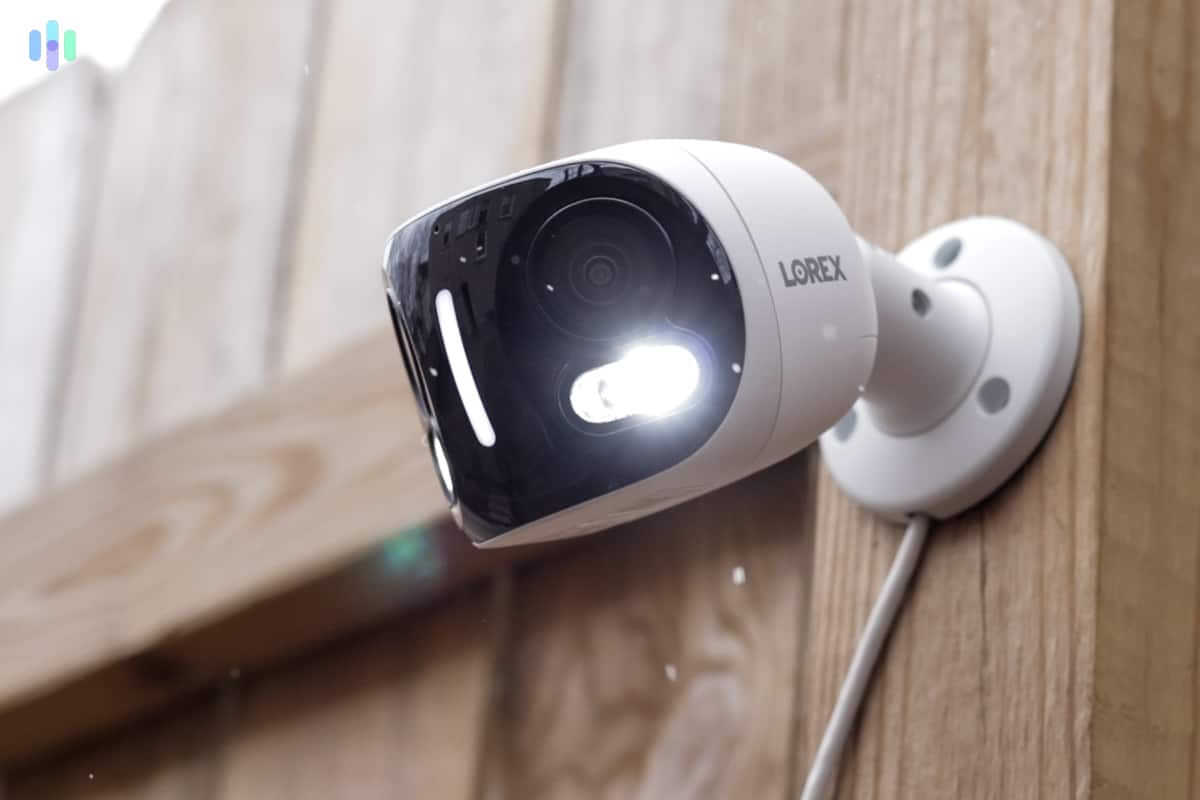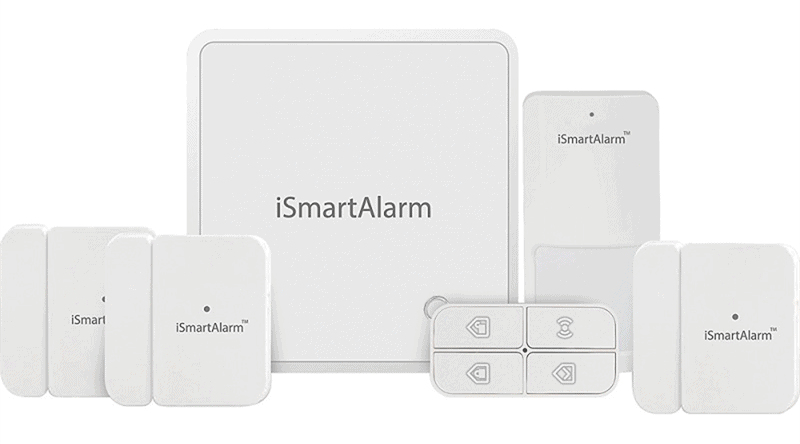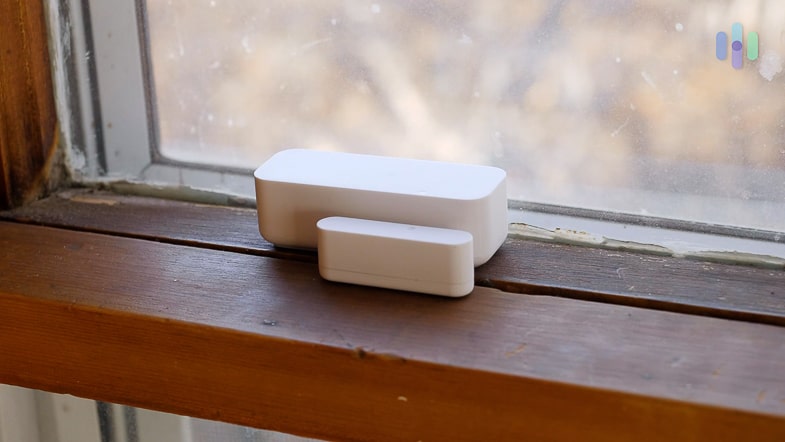Smoke alarms are a necessity, but let’s face it: A smoke alarm that won’t stop chirping will drive you crazy. That happened to us recently while testing a smoke alarm from a security system we’re reviewing. Mind you, all the equipment was new. We assume the smoke alarm had fresh batteries, and it hadn’t been installed for more than five days. Yet, it wouldn’t stop chirping every minute or so. The issue, we later found out, was dust.
That’s just one of the many issues that could cause a smoke alarm to chirp incessantly. We know that a lot of people are looking for answers, so in this guide, we put together the most common causes of beeping or chirping smoke alarms and how to resolve them.
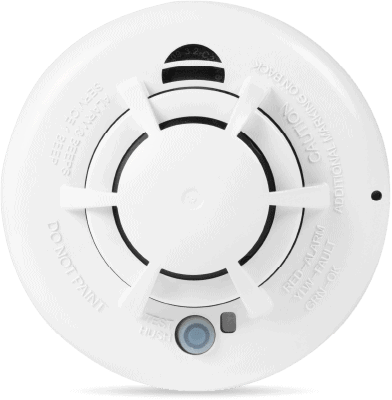
How to Stop a Smoke Alarm From Chirping
If your smoke alarm is emitting a single high-pitched chirp every 30 seconds or so, it’s most likely a sign that the battery is running low and needs to be replaced. Stopping the problem is a simple matter of changing it out. There are, of course, other reasons why your alarm might be chirping:
- Dust
- Environmental factors like sunlight or humidity
- Improperly installed battery or an open battery drawer
- Tripped circuit breaker
- Residual charge from a previous battery
- Faulty alarm
- End of life
- Smoke detected
Proactive alarm maintenance can solve almost all of these issues. Make sure, for example, to clean your device and replace its batteries regularly.
Pro Tip: Keep your home chirp-free with SimpliSafe smoke alarms. With the Heartbeat feature, SimpliSafe constantly checks sensor status to alert you when their batteries are low or when they’re out of range. See how the magic happens in our SimpliSafe review.
What Do Smoke Detector Noises Mean?
The first step to identifying the issue is determining what type of noise your smoke alarm is making. Smoke alarms emit chirps and beeps to communicate different things, from detecting actual smoke to low voltage from the batteries. Here’s what those noises typically mean:
- Continuous beeps: Usually, if your alarm is emitting a series of continuous beeps, the device has detected smoke. In the case of a single alarm, the smoke is in the immediate vicinity of the device itself. In the case of an interconnected detection system, the alarm could be coming from any of several devices throughout your house.
- Single beeps: Single beeps that occur 30 seconds to one minute apart usually suggest the battery in your device needs to be replaced. However, they can also signal other issues with your device, including dust in the sensors (such as in our case) or that the unit has reached EOL (end of life) and needs to be replaced.
- Multiple beeps: Multiple beeps from your smoke alarm could signal specific problems or other kinds of alarms. For example, your device may come with carbon monoxide detection and use a different number of beeps to signal a carbon monoxide problem. A First Alert detector will beep three times if the device is malfunctioning or five times if the device has reached EOL, for example.1 In contrast, a Universal Security alarm will beep twice, pause for three seconds, then beep twice again if one of its interconnected alarms detects smoke.2 Check your device manual to discover what a specific kind of chirp may mean, as it will differ by manufacturer.
Changing the Batteries in Your Smoke Alarm
As we have mentioned, the most common reason a smoke alarm chirps is because it needs a new battery. Thankfully, it’s easy to change a smoke alarm’s battery. This was the first thing we tried when our new smoke alarm started chirping, thinking there was just something wrong with the battery that came with it.
Here’s how to change a smoke alarm’s battery:
How to Change the Batteries
- Remove the battery’s cover. Some twist off, others pop off, and a few have screws.
- Remove the old battery.
- Make sure the battery’s positive and negative labels match up with those on the device.
- Install the new battery.
- Use the test button to ensure that the detector is working.3
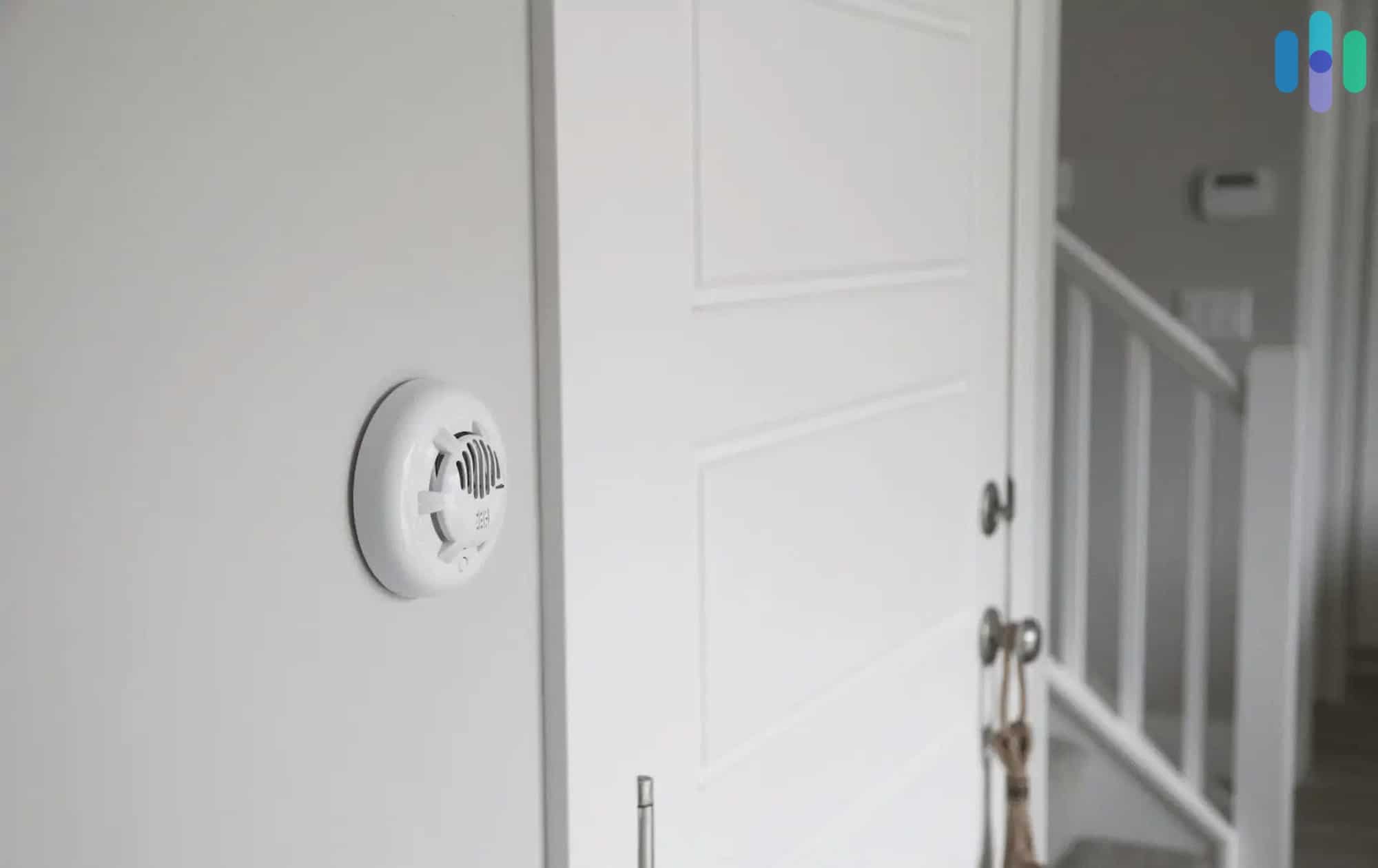
Clearing Dust From Your Smoke Alarm
Unfortunately, changing our smoke alarm’s battery didn’t fix the chirping. So after confirming that it wasn’t a battery problem, we moved on to the next easiest fix – cleaning the sensor.
Dust can keep smoke alarms from working properly. They can either interfere with the device’s battery connection or block off the sensors. Both could have caused the chirp we were hearing, but we’re guessing it was the latter because we cleaned the battery terminal after changing out the batteries.
Any of these three methods could work, but we personally went with the first two.
- Use a vacuum cleaner. Remove the faceplate from your device and use a soft brush attachment to remove dirt and dust. Be gentle!
- Clean with a wipe. A wipe is useful for cleaning the outside of the unit and clearing dust from any vents in the outer casing. Most commercial wipes will work, but you can make your own using a clean, soft cloth and a mild detergent.
- Use compressed air. Compressed air is a handy tool for getting dust out of places a vacuum or wipe can’t reach. It can also be useful for quick monthly cleanings.4 But after blowing dust off, make sure to use a vacuum cleaner to remove any that might have been dislodged inside the smoke alarm’s chamber.
The More You Know: While there are brands that sell canned air designed specifically for cleaning electronics, they are not ideal for some types of smoke alarms, such as ionization sensors. Check your smoke alarm’s manual before using canned air.
Resetting a Smoke Alarm
When you replace a smoke alarm’s battery, a residual charge may remain in the device. This charge can cause periodic chirping. It can be useful in such cases to reset the alarm, a process which drains this charge. The steps differ for battery-operated and wired smoke alarms.
Battery-Operated Alarms
Resetting a battery-operated device takes just three steps:
- Remove the battery.
- Press the test button and hold it for 15 seconds.
- Re-install or replace the battery.
Wired Alarms
Wired devices use your home’s electrical power. However, most have backup batteries that need to be replaced occasionally. To do this:
- Shut off your home’s main power breaker.
- Disconnect the alarm unit’s power cable.
- Take the alarm down.
- Take out the backup battery.
- Hold the test button for 15 seconds to drain any residual charge.
- Re-install or replace the backup battery.
- Reconnect the alarm to the power cable.
- Replace the alarm.
- Turn your home’s main power break back on.5
A Checklist for Stopping the Chirping
A number of factors could cause your smoke alarm to chirp, so we’ve prepared a basic list of steps to help you identify and fix the specific problem:
- First, replace the old battery.
- If you’ve installed a new battery and the alarm continues to beep, drain any residual charge from the unit. Remove the unit from the ceiling and remove its battery, then hold the test button for 15 seconds. Next, replace the battery.
- If the unit continues to beep, clean it using the methods we outlined above.
- If you’ve tried the first three steps and the alarm is still beeping, it is likely at the end of its life and needs replacing.
You can shut a unit down temporarily by following our guide to shutting off a smoke alarm.
Buying a New Smoke Alarm
According to the Federal Emergency Management Agency (FEMA), the maximum life of a smoke alarm is 10 years. If you have a unit older than this, you should definitely replace it. In addition, your detector may need to be replaced if you can’t stop it from chirping or if the test button doesn’t work. Once you’ve said goodbye to the old unit, though, how do you go about picking a new one? Well, when we’re comparing alarms, we look at four factors.
Sensor Type
Smoke alarms come with one of three types of sensors.
- Photoelectric: This type of alarm detects fire by looking for visible fire particles that reflect light into a sensing chamber. It detects smoldering, slow-burning fires with a great deal of smoke especially well.
- Ionization: This type of alarm uses a small amount of radioactive material between two electrically charged plates to detect invisible fire particles. As a result, it is responsive to fast-burning, flaming fires with less smoke.
- Dual: Dual-sensor alarms use both types of sensors, photoelectric and ionization, for complete protection.
Power Source
Smoke alarms may be powered in one of two ways.
- Battery power: Many alarms run on batteries alone.
- Hardwired power: Other alarms are connected to a home’s electrical system either through direct wiring or via wall plug-in. Usually, these alarms come with backup batteries should the home’s power fail.
Security Features
Obviously, all fire alarms are designed to detect fires. However, some come with additional features, such as these:
- Carbon monoxide detection
- LED emergency lighting
- Alarm strobe lights
- Vacuum-sealed, 10-year batteries
Price
The price of a smoke alarm varies in range depending on the type of alarm you’re looking to purchase. You can buy the cheapest battery-operated alarms for around $10. The most expensive models can cost as much as $65, but they include some of the best smart home devices on the market, like Google’s Nest Protect.
Generally speaking, an average alarm with dual sensors costs around $25. Wired alarms tend to be more expensive, though. Often, an electrician must install them, or you purchase them as part of a larger home security system. As a result, they range from $80 to $120.
TIP: Make your home safer by installing a carbon monoxide detector in addition to a smoke detector. In fact, you can purchase units that include both smoke and CO detection so you’re doubly protected.
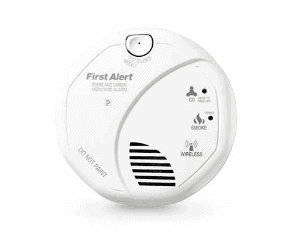
Battery-Operated vs. Hardwired Detectors
Which basic type of smoke alarm is right for you? Let’s talk pros and cons.
Battery-Operated
Battery-operated smoke alarms are self-contained units that get their power from batteries. These are some advantages of this style of detector:
- It’s easy to install.
- It works even when the home’s power is out.
- It’s affordable.
However, battery-operated detectors have a disadvantage too:
- They require regular testing and battery replacement.
Hardwired Detectors
Hardwired alarms often come as part of a complete security package with multiple devices, such as security cameras and window sensors. However, you can also purchase single units that must be wired directly into your home’s electric grid. Alternatively, some detectors can be plugged into wall outlets. These are some advantages of this style of alarm:
- They don’t require regular battery testing and replacement, although you may still need to occasionally replace the backup battery.
- Some versions can be chained together to create a system of sensors.
However, these detectors have some cons too:
- They require professional installation.
- They may not work if your power goes out (though some versions include battery backup).
- They are more expensive than battery-operated detectors.
How Often Should You Change Your Batteries?
Obviously, battery-operated smoke alarms work on batteries, but some hardwired units come with battery backups in case your home loses power. If your detector requires batteries, it’s important that you test them regularly and change them out. FEMA recommends installing new batteries once a year. However, some newer models, such as detectors from First Alert, include sealed, 10-year lithium batteries that will last the lifetime of your unit.6
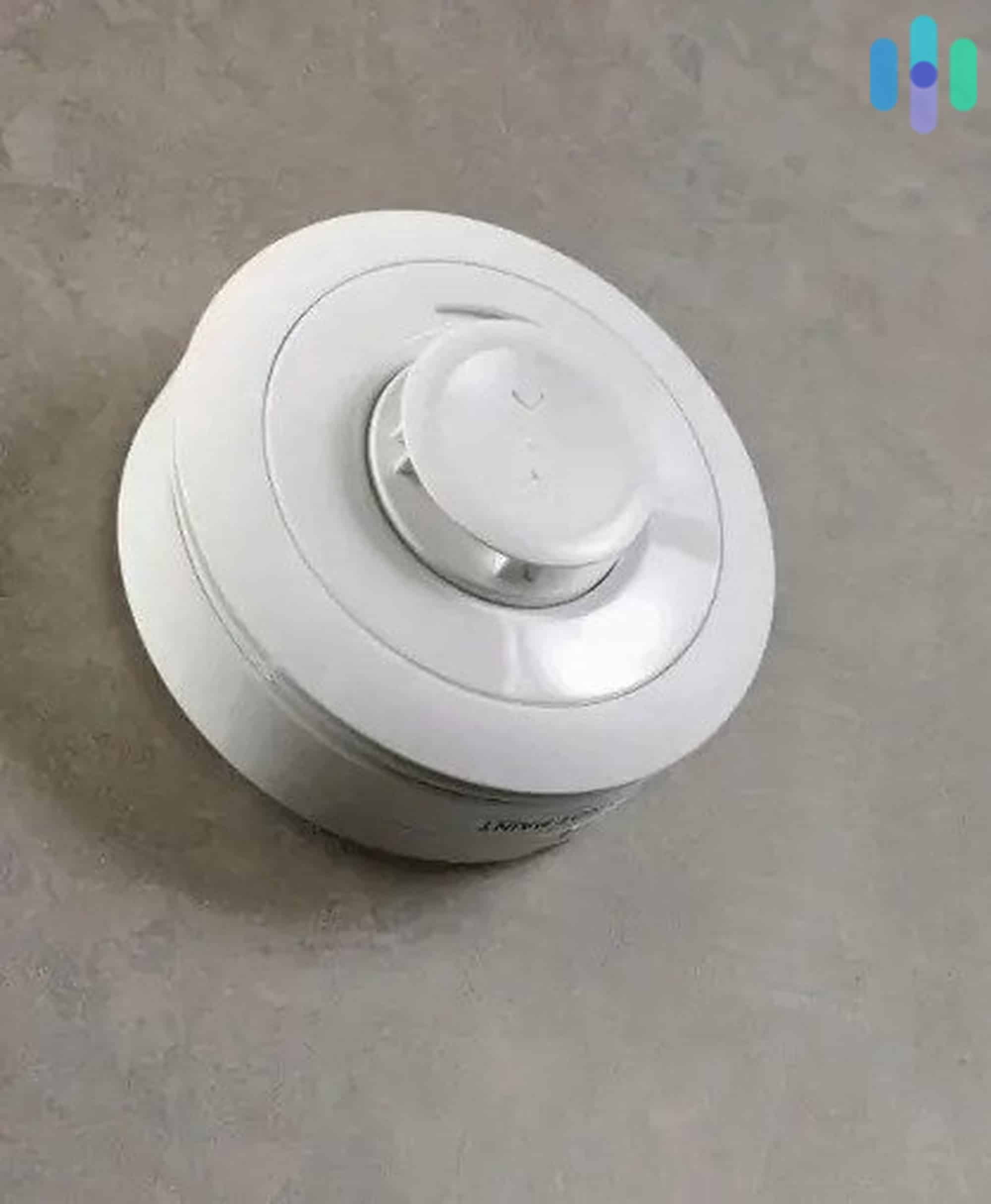
What if Your Problem Is False Alarms?
Chirps can be annoying, but false alarms can be a real problem. When your smoke alarm goes off and there’s no fire, you can become complacent, assuming every time there’s an alarm that it isn’t an actual emergency. Then, when an emergency does happen, you aren’t prepared.
What can you do, though, to eliminate false alarms? As it turns out, many of the same problems that lead to chirping can also cause false alarms. This means that many of the same fixes will work for false alarms. These are our suggestions:
- Check your batteries.
- Make sure your detector is clean and free of dust.
- If you have experienced a power outage, reset your alarm.
- If your unit is 10 years old or more, replace it.
These factors can also cause false alarms:
- Humidity: Humidity can confuse a detector’s sensors and trigger an alarm. Avoid installing units too close to bathrooms or other places with high humidity.
- Direct sunlight: Bright sunlight can also trigger false alarms, especially if the sunlight falls on the sensor chamber. The easiest fix in this case is to relocate the alarm away from direct sunlight.
- Heating or cooling vent: If a smoke alarm is installed too close to a vent, that vent can blow dust particles from the ductwork into the detector, which can lead to false alarms. This is more common when seasons change and the heating or cooling is turned on for the first time in a while. You can, of course, relocate the detector, or you could just prepare for a false alarm or two at these times.
- Insects: Insects in a sensor can also trigger alarms. Simply cleaning the detector regularly can eliminate this problem.
- Large appliance on the same circuit: A large current load, even from something as small as a vacuum cleaner, can cause some alarms to go off. The easiest solution in such cases is to switch the appliance to a different circuit by plugging it into a different wall socket. Failing this, the only real solution is to take note of which appliances cause these alarms and to be prepared when you’re using them.7
Why Does Your Alarm Go Off When You Change the Batteries?
When you change the batteries on your smoke detector, it may chirp for up to 10 seconds. This chirping is normal and signals that the device is receiving fresh power. The same thing may happen to hardwired alarms when you turn on the device’s power. If the chirping continues, however, your detector might have a residual charge from the previous battery. Take out the battery, hold down the test button for 15 seconds, and replace the battery.
Why Does Your Alarm Go Off in the Middle of the Night?
If your alarm only chirps at night while you’re cozy in bed, you may be tempted to believe it’s messing with you deliberately. However, there is actually a technical explanation for this behavior. The phenomenon is a result of two factors:
- The batteries in your device are running low.
- The temperature in your home falls at night. Lower temperatures cause power to drain more quickly from batteries.8
In short, your low batteries don’t chirp during the day because they are putting out just enough power. However, if they are weakening at night, they begin to run low and you should replace them.
What Is the Normal Lifespan of a Smoke Detector?
According to FEMA, a smoke detector should last up to 10 years. After this point, you should replace it with a new unit. Of course, you may decide to upgrade it more frequently. In any case, you should test your alarm once a month and change its batteries at least once a year to keep it in good working order.
Recap
There are many ways to protect yourself from a fire in your home. Smoke detectors are part of the first line of defense. In the simplest terms, smoke detectors can save your life. They do chirp occasionally, and it’s easy to get frustrated or annoyed with this behavior. Rather than simply removing the batteries or disconnecting the alarm, though, use this guide to diagnose and fix the problem. That way, your detector will stay in good working order and do its job.
FAQs
Still have questions about your chirping smoke alarm? We’ve put together some answers to the most common questions below.
-
How do you get a smoke alarm to stop chirping if you’ve already changed the battery?
To get your smoke alarm to stop chirping if you’ve already changed the battery, first try draining any residual charge by holding the test button down for 15 seconds. If this doesn’t solve the problem, clean the unit. A blast of compressed air will often remove the dust particles that are causing the beeps. Sometimes the device may need a more thorough cleaning with a vacuum and/or a wipe. If these methods don’t stop the chirping, you may need to replace the entire unit.
-
Will a smoke alarm eventually stop chirping?
A smoke alarm will eventually stop chirping if you do nothing. Once the battery has run out completely, the device will switch to residual power. Eventually, this will also drain and the device won’t have enough power to beep and let you know it’s out of power. You should change the battery before this happens. Otherwise, you risk forgetting that the device is no longer working. In addition, it can take days for a battery to completely drain, and the chirping will continue throughout that time.
-
How long does it take a smoke alarm to stop chirping?
An alarm will continue to chirp for at least seven days after its battery has died.
-
Will taking the battery out of a smoke alarm make it stop beeping?
Taking the battery out of a smoke alarm will not make it stop beeping. Even after the battery has died, the detector maintains a residual charge that will keep the chirp going for at least seven days. To get the device to stop chirping once the battery has been removed, you must drain this residual charge by holding the test button for 15 seconds.




